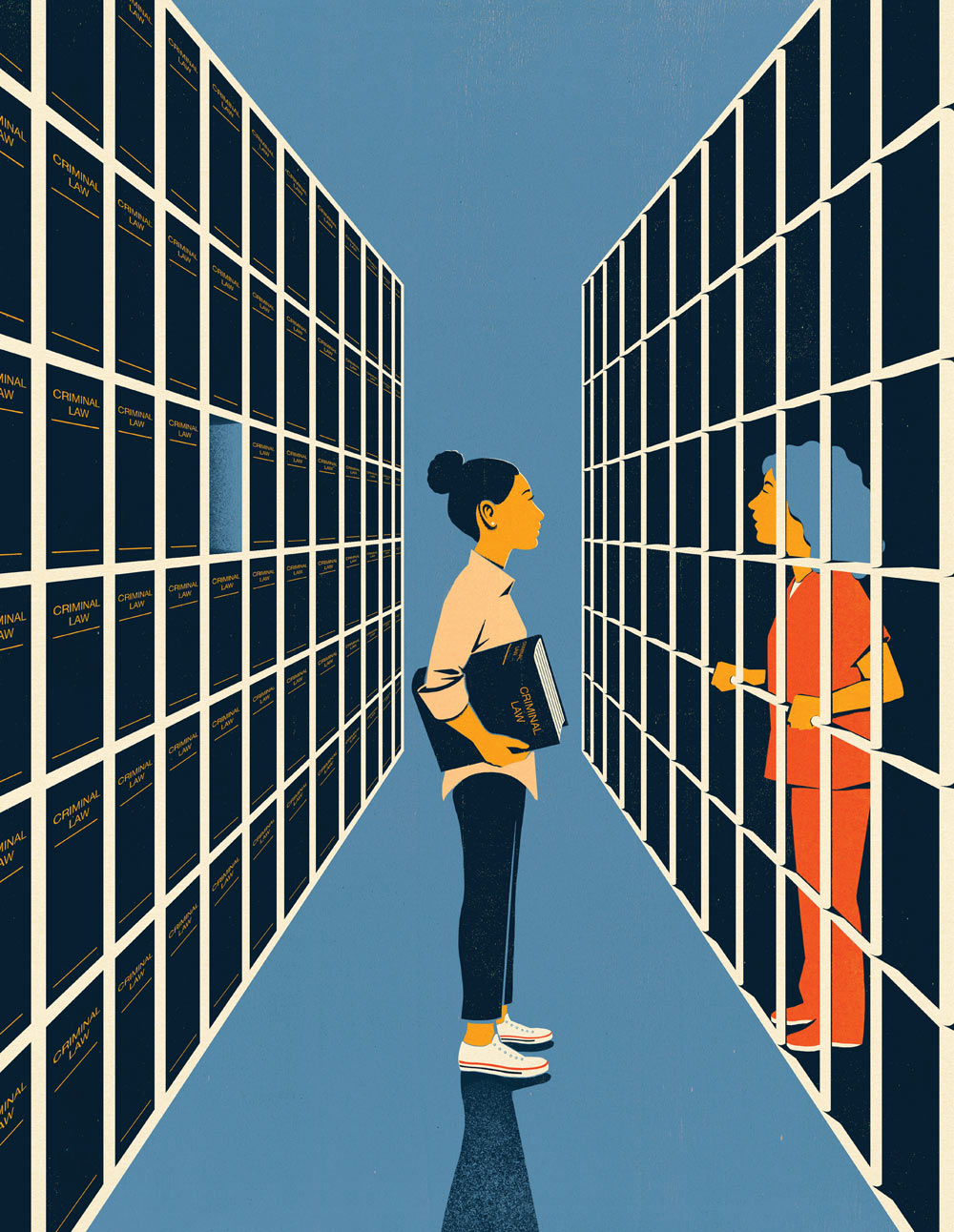
Rethinking Justice:
Not a Textbook Case
Illustration by Dan Bejar
ABOLITION AND THE REALITIES OF A LIFE SENTENCE
As a partner in Brooklyn Law School’s Rethinking Justice program, Smith works with student fellows to integrate stories like hers into the criminal law curriculum. In the spring of 2023, Professor Alexis Hoag-Fordjour’s Abolition class heard Smith describe how she spent 39 years in prison—longer than many of the students in the class had been alive. Her story was sorrowful, yet especially salient for a class focused on abolition, the movement to shrink carceral systems. A Brooklyn native, Smith grew up with a drug-addicted mother and ran away from home at 13. She spent part of her adolescence unhoused or in state-mandated placements for young people. At 17, Smith and a co-defendant robbed and killed an elderly couple.
Convicted of a double homicide, Smith was sentenced to 50 years to life in prison at Bedford Hills Correctional Facility for Women, meaning that her first opportunity for parole would occur when she was 67. However, in 2018, after her attorney, Ron Kuby, and Brooklyn District Attorney Eric Gonzalez facilitated an exchange of letters with the victim’s daughter, Smith obtained early release.
“Their daughter asked me, ‘Who are you? Why did you do this? Why were you involved in this?’” Smith told the class. “I wrote a six-page letter about my childhood on down, telling her the things that I went through, my experiences. I never really asked her for forgiveness because I felt like that was just too much because of the harm that I caused and how it devastated her life. I told her that I was sorry, and that I knew sorry wasn’t enough, but my life was such a frigging mess at that time, that I didn’t really understand how to have compassion for another human being.”
After the letters, Smith said she did not meet in person with the daughter, explaining that there was no melodramatic “kumbaya.” But the daughter’s merciful response meant everything.
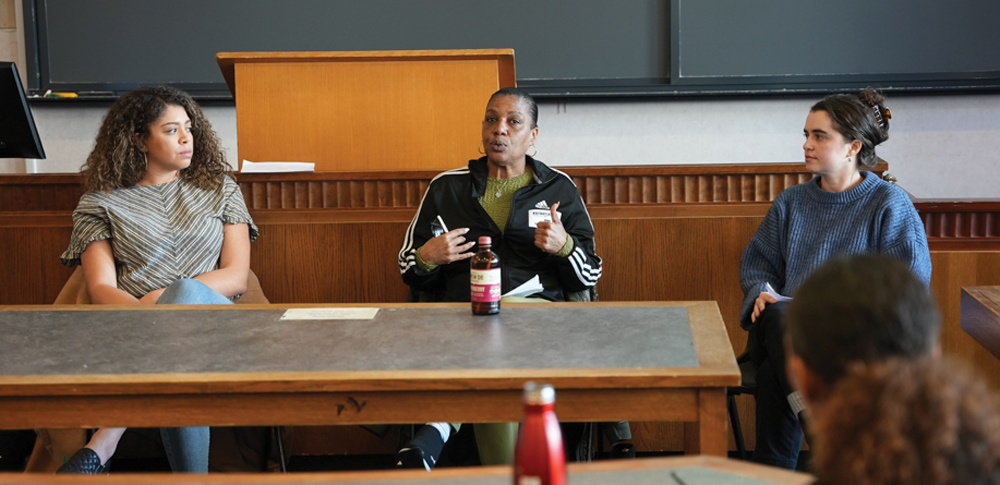
Kaitlyn Pavia ’23, a Rethinking Justice fellow who helped bring Smith’s story to the class, said it was “hard to put into words” everything she learned from Smith. Prior to law school, Pavia worked at a legal services nonprofit mostly with parents facing allegations of abuse and neglect and concurrent criminal charges. During school, as an Edward V. Sparer fellow and member of the National Lawyers Guild, she organized several critical discussions on the family regulation system that included previously incarcerated parents.
“When this opportunity came up for Rethinking Justice, it was a no-brainer that I wanted to apply and get involved,” Pavia said. “A big thing that is missing from the legal curriculum is the expertise of people who are impacted, and who know the realities of the justice system.”
The impact of incarceration on the trajectories of family members’ lives is especially overlooked, Pavia said. Smith shared in a first-year Criminal Law class the story of how prison officials took her daughter away shortly after the birth, telling Smith she would never see the child. Seated next to Smith at the front of the classroom, alongside the other fellows, Sydney Parks ’23 and Abby Fink ’23, Pavia was surprised to see students crying.
“Prison officials told Roz [Smith], ‘You’re not going to be part of her life,’ and she completely went against that and found any possible way that she could be involved,” Pavia said. Smith helped to expand parenting programs at Bedford Hills prison, earned a GED and bachelor’s degree, and was featured in the 2003 film What I Want My Words to Do to You, which documents the Bedford Hills writing workshop led by playwright and author Eve Ensler. That workshop inspired Smith to get state prison approval to launch a similar program after her own release.
Parks, who specialized in corporate law and started at Greenberg Traurig as an associate this fall, joined Rethinking Justice to stay connected to her passion for pro bono work involving the carceral system and civil rights. Smith’s reaction to abolition reflects the nuanced experience of imprisonment, she said.
“You would think someone who served all that time in prison might want to end the carceral system completely. But Roz brings a fresh perspective, because that’s not the case,” said Parks.
Indeed, Smith credits a community of other women serving sentences at Bedford Hills for helping her find a new path and wonders what might have happened if she had found help earlier in life. Today, she has devoted her life’s work to advocating for those still incarcerated.
“A lot of abolitionists feel that they don’t want to fix up the prisons or help anybody in prison because if they do, they’re perpetuating mass incarceration,” Smith told the class. “But what I feel, after doing 39 years, is that I needed somebody to be there for me and fight for me.”
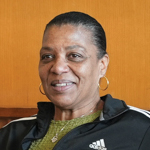
RETHINKING JUSTICE AND THE POWER OF STORIES
A former public defender in the Bronx, Simonson represented nearly 2,000 criminal defendants in five years, virtually all people of color. That experience made her frustrated at how criminal law classes largely did not reflect the experiences of people facing criminal charges, nor did they contextualize the impact of race, gender, and class on the criminal adjudication system.
“There is a growing sense that for big change to ever happen, it has to be led by the people who are directly impacted by the criminal system,” Simonson said.
One thing that distinguishes Rethinking Justice from other programs featuring the directly impacted voices is the way partners’ stories connect to the classroom curriculum, helping students learn the doctrine, she said. “There is a lot of pedagogical literature that shows that you’re more likely to retain information if it’s connected to a story.”
In the first-year criminal law classes, Smith shared her experience with students learning the degrees of homicide.
“We would have the statute behind her on a screen and go through each element,” Parks said. “Usually, students are just reading cases that are decades old, that have no personal meaning to us. When Roz was sitting there discussing her experience of being charged with a double homicide, that’s something that you remember and take home with you.”
The fellows emphasized that one of the most powerful parts of the program is working with someone who has spent time in prison; most law school students, especially first-year students, have never had that experience.
“It’s very easy to look at someone on paper and make assumptions about their life, or what should happen to them, but when you listen to someone like Roz tell her story in full, [your thoughts become] less ‘she’s just a criminal,’ and more ‘this is why these things happen,’” Parks said. “Look at her life, her past, how she grew up. It makes students—including those who want to become prosecutors—think, ‘How can we change the system?’ ‘How can we help this neighborhood?’ and ‘How can we implement resources?’”
Pavia, who in August began working in the Staff Attorney’s Office for the Second Circuit Court of Appeals, agreed. “We need to be really cognizant of the impact that we all have as law students and future criminal defense attorneys, future prosecutors, future judges… All of us have so much more power than we realize,” she said.
The experiences of each of the four previously incarcerated partners also provide lessons in how careless mistakes, and sometimes outright misconduct, by defense attorneys, prosecutors, and police, can lead to wrongful convictions.
CRIMINAL PROCEDURES: A JAILHOUSE LAWYER’S LESSON ON INTERROGATIONS
After the prosecution charged her with the killing, Harnett sought to defend herself in court, becoming a jailhouse lawyer, deeply versed in the law and her own case. Over the next six years she immersed herself in the Rikers Island law library and, lacking access to the internet or a law dictionary, deciphered unfamiliar terms by searching a database for case law examples. Although she successfully petitioned the court to dismiss the felony murder and robbery charges before her trial, she was ultimately convicted of second-degree murder under New York’s accomplice liability theory. After filing an appeal, she spent the next seven years incarcerated in Bedford Hills, working on her own and other people’s cases, filing Article 78 proceedings (to review a state decision), resentencing motions, and writs of habeas corpus. She was released after filing a resentencing application under the state’s 2019 DVSJA which allows certain incarcerated domestic violence victims to obtain reduced sentences. Harnett maintains that being present at the scene of the crime is not actually illegal and continues to seek justice in clearing her name. She said she recently uncovered evidence that raises suspicion about the motives of the sole eyewitness in the case.
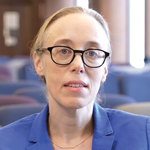
“We worked closely with the criminal law faculty, studying their syllabi and identifying doctrinal and policy areas that we thought our partners could really weigh in on,” Golub said. For Ristroph’s class, which was studying police interrogations, Harnett described her arrest and the questioning that followed in vivid detail. The students were able to recognize the ways police may violate the rights of the accused.
Harnett spent two and a half days in a police interrogation room wearing a white jail jumpsuit streaked with her own menstrual blood and asking for a lawyer and her seizure medication, to no avail.
“Would you say the doctrinal rules, the guidance for these interrogations, don’t matter because police ignore them anyway?” Ristroph asked Harnett.
Harnett agreed, with one exception. “The thing that was legal was the trickery and deception,” Harnett said. “The police are legally allowed to go into the room and say, ‘she said you did it’ or ‘he said you did it [regardless of whether that is true or not].’ However, everything else was illegal.”
The deceptive interrogation tactic was important to her case. Her former boyfriend, who pleaded guilty to manslaughter, initially blamed Harnett for the killing but later recanted his statement in a letter to Harnett’s attorney in which he admitted he lied to keep Harnett from going free without him. The letter was never presented in court, nor was her ex called as a witness. However, after working with Professor Kate Mogulescu, along with Law School students in the Criminal Defense & Advocacy Clinic and the Survivors Justice Project, Harnett was released early. She contended that her abusive relationship was pivotal to her case because her boyfriend threatened to kill her, too, on the night of the park slaying.
In partnering with Rethinking Justice, Harnett explained that she looks out at the classroom of students who will become defense attorneys or prosecutors and hopes to get at least one to remember that the accused may be innocent.
“I spoke a lot about professional responsibility, about the ethical guidelines, and how, whether it be a defense attorney or a potential prosecutor, if they fail to follow their ethical obligations, such as turning over material that is conducive to the defense, they could potentially be putting an innocent person in jail,” Harnett said.
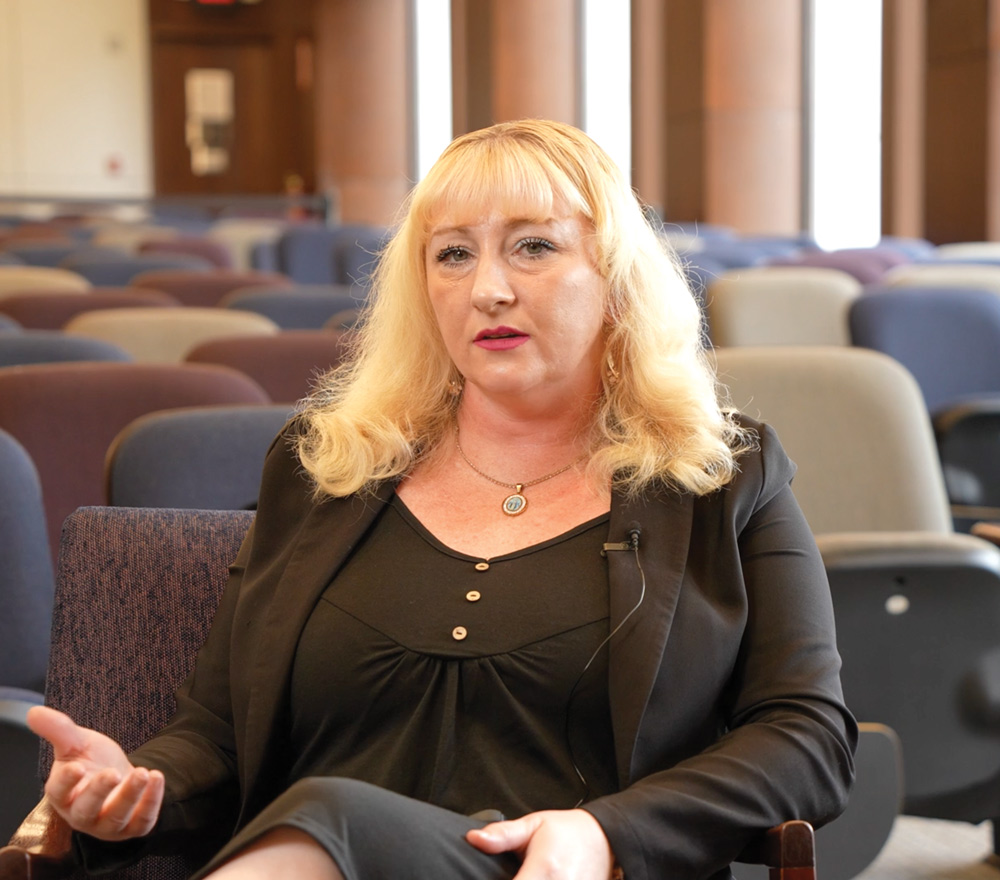
EVIDENCE OR THE LACK THEREOF AND ONE WOMAN’S SOLITARY CONFINEMENT
“We did a lot of community-based project work in collaboration with the school, trying to bridge the academic nature of what students learn in law school with the realities of the system that people experience every day, and the devastating effect on their communities,” said Golub.
Those realities were on display this spring, when Golub attended Professor Anna Roberts’ Evidence class alongside partner Candie Hailey-Means. A mother and teacher, Hailey-Means spent 1,122 out of 1,168 days on Rikers Island in solitary confinement, unable to raise $100,000 bail, confused as to what she was charged with, and distrustful of her public defender, who wouldn’t listen to her story.
Hailey-Means had been charged with assault and attempted murder, after being wrongly accused of stabbing an infant injured during a melee. In truth, a vindictive former friend and two other women attacked Hailey-Means, who was walking with her friend’s 4-year-old daughter in the Bronx. One of the three women, who was wheeling a baby in a stroller, launched the stroller at Hailey-Means, causing the infant inside to fall out and reopen a scab. The women claimed it was a freshly inflicted knife wound.
Before Hailey-Means was exonerated, her public defender urged her to accept a plea for 18 months for time served instead of standing trial and potentially facing 25 years to life.
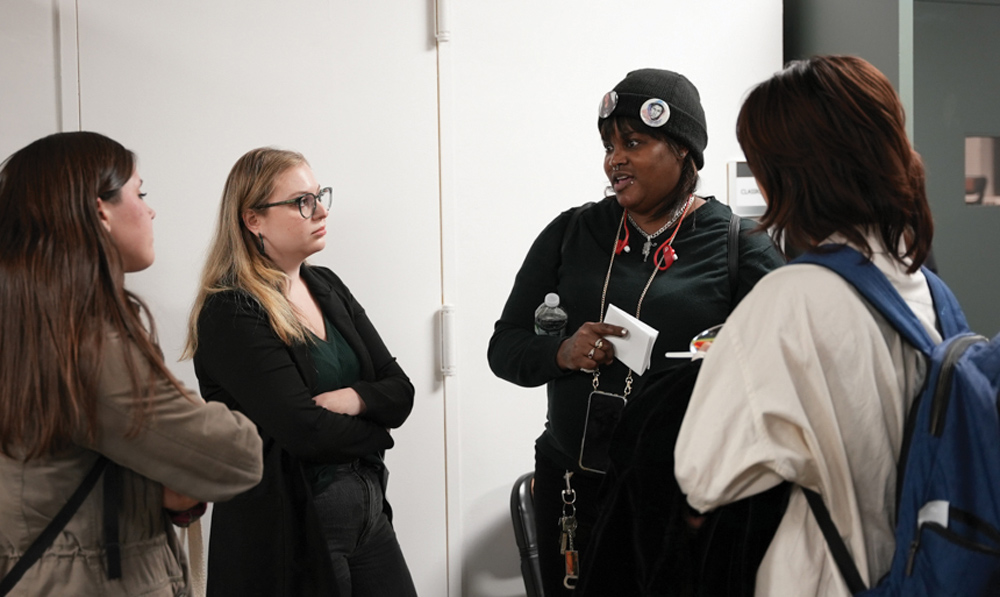
Another program partner, Eileen Maher, was charged with a burglary she said her ex-boyfriend committed after stealing keys from her apartment and gaining access to the home of a pet-sitting client of hers. The prosecutor was trying to charge her with conspiracy, which carried a 15-year minimum sentence.
“I didn’t want that for myself,” Maher told the class, adding that after 420 days in Rikers Island, she took a plea as the most expeditious way out.
Hailey-Means opted against the plea, and the case began falling apart, even pre-trial. The witnesses that her lawyer said would testify against her—an EMT, a police officer, and a deli owner—were dismissed as offering only hearsay because they saw nothing firsthand and believed the lies of the actual attackers. The EMT did say that the baby had a scab on her head, bolstering Hailey-Means’ argument that she did not have a knife and would not stab a child.
The key piece of trial evidence emerged after Hailey-Means insisted, against her lawyer’s advice, that a 911 call be played. She had called 911 three times seeking help for herself and her friend’s 4-year-old, whom she referred to as “my baby” for expediency, but her attackers then stole her phone, and even her own lawyer thought the call came from the women with the infant.
“The woman on the call said ‘My baby and I was just jumped, my baby and I was just jumped. They robbed me, they robbed me, I need police assistance,” Hailey-Means recalled. “So, I’m sitting in a chair thinking, ‘That’s my f**-ing voice.’”

Testifying on her own behalf, Hailey-Means told jurors, “That was me. That was my voice saying, ‘help me, help me.’” As she told the story to students, Hailey-Means broke into tears at the memory, saying. “I’m sorry, class. They took three years of my life. You know, all they had to do was just listen to the phone call.”
It wasn’t just the nightmarish story that registered with the students, Golub said. It was the ways in which Hailey-Means’ defense attorney, the prosecutor, and the criminal legal system at large failed her, resulting in Hailey-Means spending years in a cell by herself 24 hours a day for a crime she did not commit. She now advocates for ending solitary confinement.
“It’s wild to me that you can go your entire law school career without ever interacting with someone who has lived experience within the carceral system,” said Golub, who is again serving as a senior fellow in the program this year.
“A friend told me that students continued to bring up Candie’s visit for weeks afterwards. When the application of an evidence rule came up in case law, a student raised their hand and said, ‘Well, wait a minute. What about what happened to Candie?’ And to me,” Golub said, “that exemplifies exactly what you hope to get out of a program like this.”
Hailey-Means said that while retelling her experience was difficult, it was worth it to raise awareness among future attorneys.
“Whether it’s a free lawyer or whether it’s a paid lawyer, we need more good lawyers,” Hailey-Means said. “If I had a good lawyer, I wouldn’t have spent three years on Rikers.”